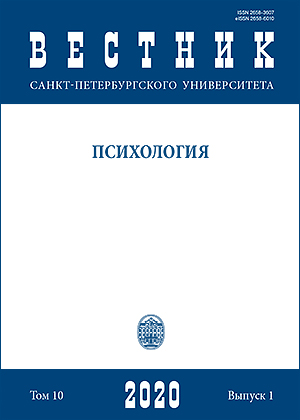“Grounded theory” as a method of psychological mapping of social situations
DOI:
https://doi.org/10.21638/spbu16.2020.102Abstract
This article, of a methodological genre, substantiates the qualitative approach to the study of social situations. Acceptance of contextuality in cognition and action, the study of dynamic relationships of the individual and environment, objective and subjective measurements of their interaction in everyday life, the formation of the concept of man as a situation (L.Ya. Ginsburg) — modern psychology does not have tools for the realization of these theoretical aspirations in research practices. It is proposed to use one of the classical methods of qualitative analysis ‘Grounded theory’, familiar to sociologists and to a lesser extent psychologists. The following types of Grounded theory stand out: first generation (positivist) and second generation (postmodern). In reality, A.Clarke’s version of qualitative analysis turns into semantic mapping situations that closely resembles the Russian tradition of social cognition, which always takes into account the role of perception, categorization and interpretation of situations by their immediate participants as members of various communities and groups (G.M.Andreeva, N.V.Grishina). The article demonstrates the procedures for constructing situational maps: theoretical sampling, inductive-deductive (abductive) strategy of data analysis, constant comparative analysis, memo writing, and coding. The main steps and techniques of the method are illustrated by the results of the empirical study of magical practices (clairvoyance, astrology, palmistry, fortune telling) in the modern metropolis. Qualitative analysis of ten in-depth interviews with representatives from “magic professions” working in one of the esoteric centers of Moscow, allows for the creation of a semantic map of the marginal situation of their social activity. The article concludes that qualitative research methodology is ‘sensitive’ to the context and it can be considered as the most convenient tool for studying social situations. The specific method of Grounded theory, initially developed in sociology, is the answer to the quest of modern psychology, whose theoretical innovations to a large extent unexpectedly defined empirical research.
Keywords:
qualitative methods in psychology, Grounded theory, situational approach, personality and situation
Downloads
References
References
Downloads
Published
How to Cite
Issue
Section
License
Articles of "Vestnik of Saint Petersburg University. Psychology" are open access distributed under the terms of the License Agreement with Saint Petersburg State University, which permits to the authors unrestricted distribution and self-archiving free of charge.




